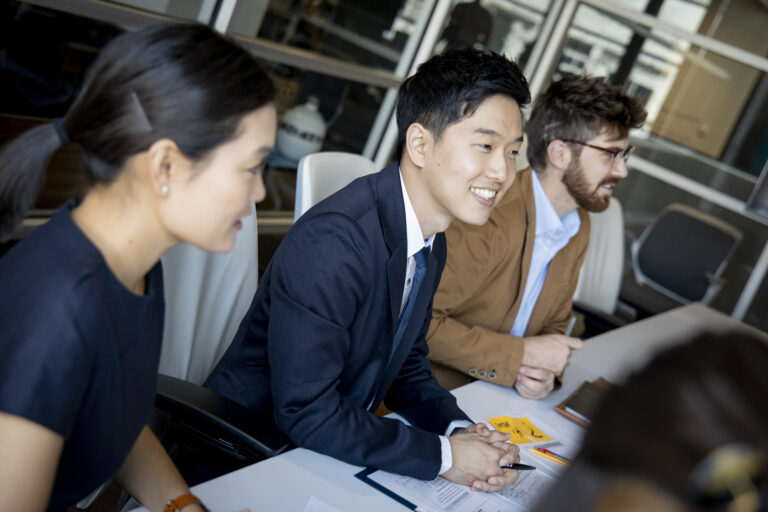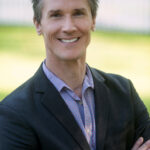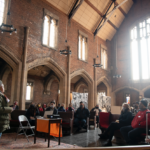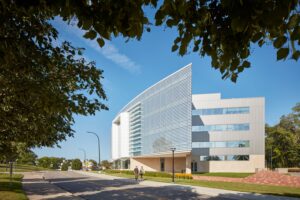
- Kim Kisner
- Education
- 02/14/2023
Erb Institute Develops Ideas to Help Business Partners Get Things Done for Sustainability

The Erb Institute at the University of Michigan has a mission to create a sustainable world through the power of business. The institute is a partnership between the Ross School of Business and the School for Environment and Sustainability, where students and business partners work together to fulfill this mission.
What does this translate to, how does it work, and what impact does it have on Southeast Michigan Businesses?
We talked to the Erb Institute Managing Director Terry Nelidov to find out more.
Nelidov began his career as a US Peace Corps Volunteer in Paraguay in the early 1990s. Later he served as founding director of INCAE Business School’s Business Leadership for Sustainable Development Network in Latin America, as General Manager for AmeriCasas (a startup land-development company in El Salvador), and then country representative for Catholic Relief Services in Peru.
He holds a BS in Industrial Engineering from Stanford University and an MBA from IESE Business School in Spain.

Q: The mission of the Erb Institute is to create a sustainable world through the power of business. How do you approach this?
A: Yes, this has been our mission for over 25 years and remains our mission today, although our areas of focus have expanded and evolved.
When Fred and Barbara Erb endowed the institute in 1996 the focus was on two areas: teaching and research.
Over the years the program has evolved to encompass applied research and impact. Meaning we now work to translate research results into practical management tools, case studies, and frameworks for business leaders to put into practice.
So today, we have expanded how we think about the work we do into three main pillars; research, teaching, and business engagement.
The latter challenges us to be involved in the global dialogue on sustainability and to bring back new questions to inform our research and teaching, while actively sharing the thought leadership of our faculty and students to inform that global conversation.
One way we do this is by leading and taking part in global sustainability events such as the SB 2017 and 2019 conferences, the Innovation Forum UK, and more.
The Erb Institute is so much more than a teaching institute – it’s about making an impact with businesses and nonprofits focused on sustainability through teaching and research and then sharing the work that comes out of that to scale up our impact in Michigan, across the United States, and beyond.
Q: How are you engaging with businesses?
A: Great question and my best response would be simply two examples.
Recently we hosted the Michigan Business Sustainability Roundtable (MBSR) to bring together senior Michigan business leaders from Kellogg, Dow, Meijer, and others committed to working toward transformational change in social and environmental performance and asked what challenges they have in achieving their goals at the policy level, and how we could support them in advocating together for climate change and racial justice in Michigan. This was a six-month process.
We are looking to deepen our connections with policymakers and advocates at the state level and use our collective voices to raise the bar on business, sustainability, and justice in Michigan.

The second example involves a groundbreaking research project with Ford Motor Co. In 2018 Ford came to us with a simple but intriguing question, “How can we measure the impact of smart mobility on the human condition?”
We launched a two-year research project, co-hired a postdoctoral research fellow, and created the Ford Model of Human Progress. What was particularly exciting about this initiative was that a year later, HP Enterprise attended a Sustainable Brands event where they heard about the model and then took it back to Silicon Valley and began adapting Ford’s model to HP Enterprise’s work in the tech industry.
Q: What sustainability issues do you focus on beyond the environment?
A: While climate change, water, biodiversity, circular economy, and plastics remain at the forefront, the scope of sustainability has expanded to include a range of social issues, even the very concept of justice and the role of business in a just society.
Businesses are being called on to play a significant role here…to support social issues, such as access to education, access to health, and employee engagement and well-being.
So, we’ve expanded with this evolution. Indeed, social justice is a significant focus area within our new five-year strategic plan, which focuses on preparing “architects of change” who can work at the intersection of business, sustainability, and justice.
Q: How do you think the graduates of the Erb Institute impact businesses?
A: We have alumni working in leadership positions in 17 countries. I can point to three examples of how they are making a significant impact.
The first is Monique Oxender. While still studying at the Erb Institute, Monique took an internship at Ford and then a full-time position, helping to create their human rights function in the early 2000s. She is now chief sustainability officer at Keurig Dr Pepper, a global platform for sustainability impact. All of that began with her Erb experience.
A great example of nonprofit leadership is Laura Rubin, our first Erb graduate. She worked on the Huron River Watershed Council for 25 years and is now a recognized leader in the Midwest and Great Lakes Region in water crisis and habitat issues.
A third example is Rep. Joe Tate, who went into public service and politics and was recently elected as the first Black speaker of the Michigan House of Representatives. Interestingly, he was also a USMC Veteran and a former NFL offensive lineman!
Q: How do you think the work you are doing at the Erb Institute impacts businesses in general?
A: First, the students in class today will be in leadership roles in 10 to 15 years.
Second, we make an impact through the power of our ideas and the research of our faculty. The innovations that come out of working with students, researchers, and professors are the ideas that are shaping sustainability going forward.
Q: What does the future of the Erb Institute look like?
A: I can point to three big and bold goals that are outlined in our strategic plan.
First, we worked with strategy partner BSR throughout 2020-21 to conduct a series of research pieces, business roundtables, board dialogues, and strategy workshops with our faculty, staff, students, and alumni—all focused on the core question, “What should be the Erb Institute’s unique contribution to global sustainability over the next five years?”
One of the goals that came out of our global roundtables time and again is that we live in an increasingly complex and polarized world—socially, culturally, ideologically, politically, and geographically. The sustainability space is no exception, especially in the United States, and the divides are only widening. We see our contribution going forward as training and empowering sustainability leaders who can collaborate across these divides and work together on systemic solutions to complex global challenges.
The second big and bold goal is to create scalable solutions for global sustainability challenges through action-based learning and place-based research in the Great Lakes, across the U.S., and globally.
Sustainability, by nature, deals with risks and opportunities on a global scale. But what does that mean locally? How do we focus on what matters most here at home in Michigan? Are we advocating for local solutions to global problems? Are we elevating local lessons learned to the international debate? Are we learning from solutions created by others around the world to apply here in Michigan and the Great Lakes, and solutions from Michigan to inform international practice? We need to have both a global vision and a local impact.
And the third goal is scaling up. The Erb Institute is an unparalleled platform for impact that we have forged over our first quarter century. We’re asking ourselves, how can we do more? How can we have a deeper impact, accelerate change and reach out beyond our traditional audiences for impact? In short, how can we take our impact to scale over the next 25 years?
We will challenge ourselves, as an institute and as a global community, to step up our ambition. We need to expand our teaching to reach beyond students at Ross and SEAS and connect with learners in other schools across the University of Michigan, to other universities in the U.S. and abroad, to business managers and executives, and to virtual platforms for lifelong learning. We need to broaden the demographic, cultural, and geographic diversity of our community, research, business partners, advocacy networks, and media outreach.
With each new investment of time and resources, we’ll be asking ourselves: How can we do this at a scale that honors the challenge of this decisive decade for climate, justice, democratic institutions, and capitalism that serves all?
Be sure to subscribe to our newsletter for regular updates on sustainable business practices in and around Detroit.
Kim Kisner
- All
- Business
- Community
- Education
- Events

ZF Group, a global technology company with its North American headquarters in Northville, specializes in systems for passenger cars, commercial vehicles, and industrial technology. With a focus on next-generation mobility, the company develops solutions that address electrification, automation, and digitalization while aiming to improve safety, efficiency, and sustainability in transportation. SBN Detroit interviewed Anuj Shah, Sustainability Lead, for the Americas, to explore the most pressing environmental challenges in...

The Chip Bag Project, based in Detroit, is a sustainability initiative that upcycles hard-to-recycle snack packaging — particularly chip bags — into insulated sleeping bags for individuals experiencing homelessness. Founded by Eradajere Oleita, the project addresses both environmental waste and housing insecurity by transforming materials like Mylar into practical, thermally efficient solutions. In June, Oleita was among Trelllis’s 30 Under 30, its annual recognition of the brightest young...

PowerPanel, headquartered in Oxford, focuses on sustainable energy technology with a particular emphasis on hot water systems and thermal energy capture. The company designs and manufactures modular solar hybrid systems that integrate both photovoltaic and thermal components into a single unit. Its goal is to offer energy solutions that are more efficient, durable, and economically viable for a range of commercial and industrial applications. SBN Detroit interviewed Garth...







